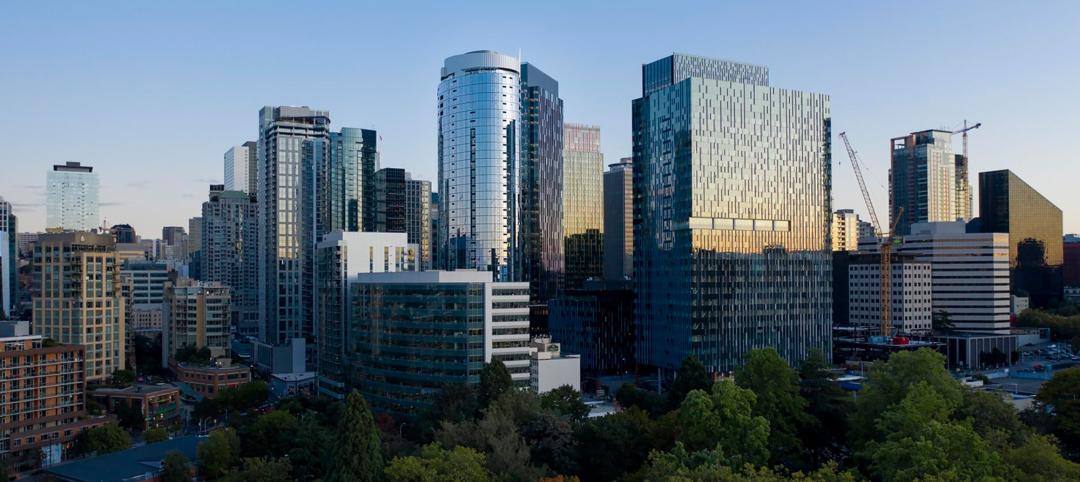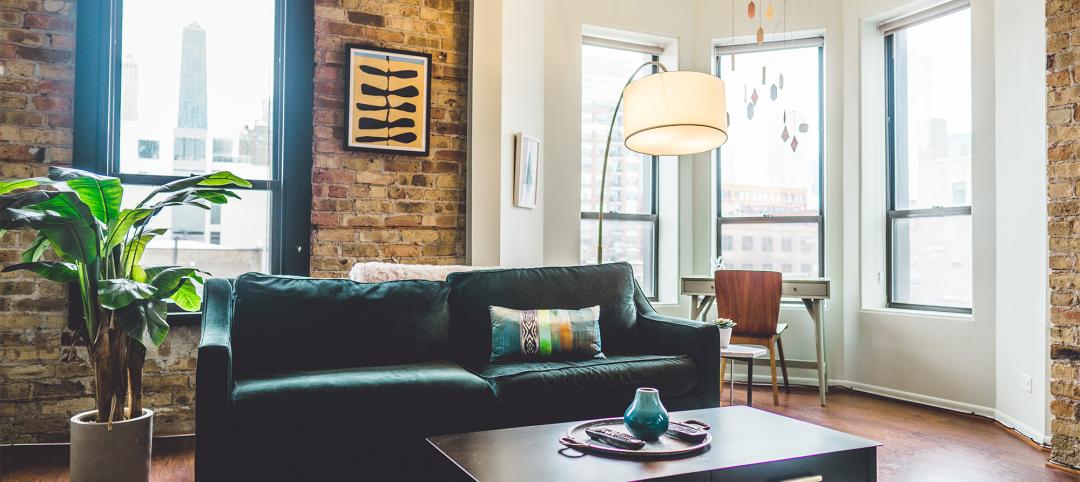In a new brief released on Sept. 29, the U.S. Green Building Council (USGBC) and Green Business Certification Inc. (GBCI) outline an expanded suite of programs and resources focused on improving building and community resilience in the face of climate risks. While governments and businesses focus on economic recovery, more frequent and severe climate events threaten to interrupt progress. Green building helps companies and communities adapt to and mitigate the effects of these growing climate concerns.
“Green buildings are the first step to creating more resilient businesses and communities while also supporting economic development and growth,” said Mahesh Ramanujam, president and CEO of USGBC and GBCI. “We know people, especially those in our most vulnerable communities, are already experiencing the costs of a changing climate and the resilience of the people in these structures is a critical factor. Resilient design, construction and operations verified through green building and infrastructure certifications can help reduce risk and vulnerability. USGBC and GBCI’s resources serve as a roadmap for resilience that has the ability to save companies money and improve the standard of living for all.”
The building and construction industry must accelerate its adoption of strategies and practices that respond to climate threats communities are currently facing. The new brief outlines USGBC and GBCI’s existing resilience resources along with new opportunities and include:
— LEED: The most widely used green building rating system offers a series of resilience design pilot credits that ensure project teams are aware of and are addressing vulnerabilities. The credits are available for new construction and align with the RELi Rating System. Currently, more than 200 projects have registered to pursue the credits. The LEED for Cities and Communities program outlines options to enhance resilience beyond a single building. More than 110 cities and communities have certified.
— Certification Systems: GBCI integrates resilience strategies across several rating systems. RELi takes a holistic approach to resilience and helps developers, companies, city planners and others assess and plan for acute hazards. LEED credits can also count toward RELi certification. PEER serves as a roadmap for designing and operating resilient and reliable power systems and microgrids and has more than 30 certified projects that serve more than seven million people. SITES focuses on creating regenerative landscapes and ecologically resilient communities and has nearly 150 projects participating.
— Data & Technology: Data will define the future of green building, which is why USGBC is working with Coastal Risk Consulting to deliver a RiskFootprint™ for buildings, communities and cities that provides a climate risk analysis. The service will integrate with LEED, Arc and GBCI rating systems to help assess a project’s vulnerability.
— Workforce Education: Equipping professionals with the latest skills and knowledge is critical to scaling resilient practices and Education @USGBC offers courses from experts working on resilience. USGBC will also open a call for ideas on enhancing resilience across the green building industry. GBCI is also developing a new RELi professional credential expected to be ready in 2021.
— Advocacy: USGBC works with federal, state and local governments and jurisdictions to advocate for policies, guidance and incentives that support green buildings and communities. A goal of that work is to ensure disaster recovery funds are spent on high quality, resilient buildings that mitigate climate risks and promote social equity and health. The latest advocacy activities are housed in the USGBC Center for Resilience.
— Partnerships: USGBC will leverage its network of members, partners and LEED users to build a community of leaders for resilient buildings, communities and cities. USGBC will establish partnerships with a variety of organizations committed to advancing resilience.
The resilience offerings are part of USGBC’s reimagined vision and economic recovery strategy, Healthy People in Healthy Places Equals a Healthy Economy. Resilience is a critical component of building a healthier, more sustainable future, but can also influence how companies and governments respond to social and economic disruptions. Resilience planning helps future proofs assets and support communities in times of crisis.
Over the last two years, reportedly more than 16 million people globally, including an estimated 1.2 million Americans, were displaced because of climate events. A number that is expected to continue to grow impacting livability and workability. In a 2019 report from CDP, a group of the world’s largest companies valued climate risks to their businesses at almost $1 trillion – with many likely to occur within the next five years. It reinforces the need for immediate solutions that can help mitigate social and economic costs that are predicted in the near term. Green building programs like LEED, RELi and other GBCI rating systems outline for business leaders and government officials necessary actions and provide a framework for communicating progress.
To learn more about resilience in the building industry, USGBC’s annual Resilience Summit will be held at Greenbuild 2020 on Oct. 1, featuring resilience leaders and the opportunity to learn the newest research and technology around resilience-enhancing designs, technologies, materials and methods. Registration for the Summit and Greenbuild virtual events is open.
Related Stories
Mixed-Use | Apr 4, 2024
Sustainable mixed-use districts: Crafting urban communities
As a part of the revitalization of a Seattle neighborhood, Graphite Design Group designed a sustainable mixed-use community that exemplifies resource conversation, transportation synergies, and long-term flexibility.
Sustainability | Mar 29, 2024
Demystifying carbon offsets vs direct reductions
Chris Forney, Principal, Brightworks Sustainability, and Rob Atkinson, Senior Project Manager, IA Interior Architects, share the misconceptions about carbon offsets and identify opportunities for realizing a carbon-neutral building portfolio.
Sustainability | Mar 21, 2024
World’s first TRUE-certified building project completed in California
GENESIS Marina, an expansive laboratory and office campus in Brisbane, Calif., is the world’s first Total Resource Use and Efficiency (TRUE)-certified construction endeavor. The certification recognizes projects that achieve outstanding levels of resource efficiency through waste reduction, reuse, and recycling practices.
Codes and Standards | Mar 18, 2024
New urban stormwater policies treat rainwater as a resource
U.S. cities are revamping how they handle stormwater to reduce flooding and capture rainfall and recharge aquifers. New policies reflect a change in mindset from treating stormwater as a nuisance to be quickly diverted away to capturing it as a resource.
Sustainability | Mar 13, 2024
Trends to watch shaping the future of ESG
Gensler’s Climate Action & Sustainability Services Leaders Anthony Brower, Juliette Morgan, and Kirsten Ritchie discuss trends shaping the future of environmental, social, and governance (ESG).
Sustainability | Feb 26, 2024
GBBN's Inflation Reduction Act Calculator goes live
GBBN has publicly released its IRA Calculator, a tool that helps you understand funding opportunities in the IRA for sustainable design.
MFPRO+ News | Feb 15, 2024
Nine states pledge to transition to heat pumps for residential HVAC and water heating
Nine states have signed a joint agreement to accelerate the transition to residential building electrification by significantly expanding heat pump sales to meet heating, cooling, and water heating demand. The Memorandum of Understanding was signed by directors of environmental agencies from California, Colorado, Maine, Maryland, Massachusetts, New Jersey, New York, Oregon, and Rhode Island.
Green | Feb 15, 2024
FEMA issues guidance on funding for net zero buildings
The Federal Emergency Management Agency (FEMA) recently unveiled new guidance on additional assistance funding for net zero buildings. The funding is available for implementing net-zero energy projects with a tie to disaster recovery or mitigation.
Sustainability | Feb 7, 2024
9 states pledge to accelerate transition to clean residential buildings
States from coast to coast have signed a joint agreement to accelerate the transition to pollution-free residential buildings by significantly expanding heat pump sales to meet heating, cooling, and water heating demand in coming years.
Industry Research | Jan 31, 2024
ASID identifies 11 design trends coming in 2024
The Trends Outlook Report by the American Society of Interior Designers (ASID) is the first of a three-part outlook series on interior design. This design trends report demonstrates the importance of connection and authenticity.

















